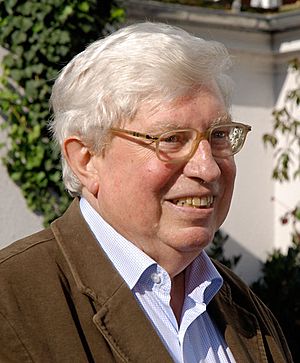Gerhard Ertl facts for kids
Quick facts for kids
Gerhard Ertl
|
|
|---|---|

Ertl in 2007
|
|
| Born | 10 October 1936 Stuttgart-Bad Cannstatt, Baden-Württemberg, Germany
|
| Nationality | German |
| Alma mater | University of Stuttgart Technical University of Munich |
| Known for | Surface chemistry |
| Awards | EPS Europhysics Prize (1992) Japan Prize (1992) Wolf Prize in Chemistry (1998) Nobel Prize in Chemistry (2007) Otto Hahn Prize (2007) Faraday Lectureship Prize (2007) |
| Scientific career | |
| Fields | Surface chemistry |
| Institutions | Technical University of Munich Leibniz University Hannover Ludwig Maximilian University of Munich Fritz Haber Institute of the MPG |
| Doctoral advisor | Heinz Gerischer |
| Doctoral students | Martin Wolf |
Gerhard Ertl (born 10 October 1936) is a German physicist. He is a professor at the Fritz-Haber-Institut in Berlin, Germany. Ertl's amazing research helped create the field of modern surface chemistry. This science explains how chemicals react on solid surfaces.
His work has helped us understand many important things. For example, it shows how fuel cells make energy without pollution. It also explains how catalytic converters clean up car exhaust. Even why iron gets rusty is clearer thanks to his studies!
Ertl's discoveries have opened the door for developing cleaner energy sources. They also guide how we create new fuel cells.
He won the 2007 Nobel Prize in Chemistry for his deep studies of chemical processes on solid surfaces. The Nobel committee said Ertl gave a very detailed picture of how chemical reactions happen on surfaces. His findings are useful in both science studies and making new products. Surface chemistry can even explain how the ozone layer gets damaged. This is because important steps in that reaction happen on tiny ice crystals high in the atmosphere.
In 2015, Ertl signed the Mainau Declaration 2015 on Climate Change. This declaration was signed by 76 Nobel Prize winners. It was given to the President of France to support the COP21 climate summit in Paris.
Contents
Early Life and Education
Gerhard Ertl was born in Stuttgart, Germany. He studied physics from 1955 to 1957 at the University of Stuttgart. He also studied in Paris and Munich. In 1961, he finished his physics degree in Stuttgart. He then moved to Munich with his teacher, Heinz Gerischer. Ertl earned his PhD degree in 1965 from the Technical University of Munich.
Becoming a Professor
After getting his PhD, Ertl worked as an assistant and teacher in Munich. From 1968 to 1973, he was a professor at the Leibniz University Hannover. Then, he became a professor at the Ludwig Maximilian University of Munich from 1973 to 1986. During these years, he also visited and taught at universities in the United States.
In 1986, he became the director at the Fritz Haber Institute of the MPG. He stayed there until he retired in 2004. He also became an "Honorary Professor" at several universities in Berlin.
Amazing Discoveries in Chemistry
Gerhard Ertl is famous for figuring out how certain chemical reactions work. He studied how ammonia is made using iron. This is part of the Haber Bosch process, which is very important for making fertilizers. He also studied how carbon monoxide is cleaned up by platinum in catalytic converters.
During his research, he found something amazing: reactions on platinum surfaces can actually "oscillate" or swing back and forth. Using special microscopes, he was able to see these changes happening on the surface.
New Ways to See Tiny Things
Ertl always used the newest tools to study surfaces. Early in his career, he used low-energy electron diffraction (LEED). Later, he used ultraviolet photoelectron spectroscopy (UPS) and the scanning tunneling microscope (STM). These tools helped him make groundbreaking discoveries about how atoms and molecules behave on surfaces.
He won the Wolf Prize in Chemistry in 1998. This was for his great work in surface science. He helped explain how important chemical reactions happen on very tiny surfaces.
Gerhard Ertl received the 2007 Nobel Prize in Chemistry for his studies. The award was given on his 71st birthday. He was very surprised and happy when he heard the news.
Personal Life
Gerhard Ertl is married to Barbara. They have two children and several grandchildren. When he is not doing science, Ertl enjoys playing the piano. He also likes to play with his cats. He is a Christian.
See also
 In Spanish: Gerhard Ertl para niños
In Spanish: Gerhard Ertl para niños
 | Kyle Baker |
 | Joseph Yoakum |
 | Laura Wheeler Waring |
 | Henry Ossawa Tanner |

